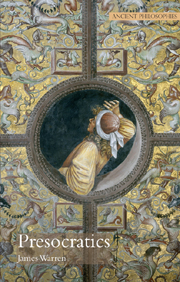Book contents
- Frontmatter
- Contents
- Acknowledgements
- Sources and abbreviations
- Chronology
- Map of the ancient Mediterranean
- 1 Introduction: reading Presocratic philosophy
- 2 Ionian beginnings
- 3 Xenophanes
- 4 The oracles of Heraclitus
- 5 Parmenides
- 6 Reactions to Parmenides
- 7 Anaxagoras
- 8 Empedocles
- 9 Democritus and Leucippus
- 10 Epilogue
- Guide to further reading
- Notes
- Bibliography
- Index of passages
- Index
8 - Empedocles
- Frontmatter
- Contents
- Acknowledgements
- Sources and abbreviations
- Chronology
- Map of the ancient Mediterranean
- 1 Introduction: reading Presocratic philosophy
- 2 Ionian beginnings
- 3 Xenophanes
- 4 The oracles of Heraclitus
- 5 Parmenides
- 6 Reactions to Parmenides
- 7 Anaxagoras
- 8 Empedocles
- 9 Democritus and Leucippus
- 10 Epilogue
- Guide to further reading
- Notes
- Bibliography
- Index of passages
- Index
Summary
Empedocles is one of the most colourful and fascinating personalities in this period of early Greek philosophy. Clearly a charismatic figure, a whole range of stories and legends grew up about him and his life, perhaps the most famous of which is that he died by leaping into the crater of Mount Etna on his native Sicily in order to prove that he had become a god (see Diog. Laert. 8.69, cf. Kingsley 1995: 233ff.). The truth of these various stories is subject to considerable doubt, but they testify to the interest and mystery generated in antiquity by Empedocles' work and his apparently ostentatious self-promotion.
Empedocles is one of the great philosophical poets and continues to provoke fascination, reignited recently by the publication of new sections of Empedocles' work rediscovered on a papyrus held in Strasbourg. It is fair to say, however, that the new interest has led in the main to many new questions and reopened various already long-running disputes; very little of the content and nature of Empedocles' philosophy can be said to be generally agreed among modern interpreters.
One poem? One philosophy?
Diogenes Laërtius, in his Life of Empedocles, mentions two titles for Empedocles' work: On Nature and Katharmoi (translated as “Purifications”) (Diog. Laert. 8.54, 56, 77). Diels and Kranz take these to refer to different works, and use this to divide the surviving fragments – all of which are composed in the same hexameter verse – according to what they perceive to be different topics or areas of thought.
- Type
- Chapter
- Information
- Presocratics , pp. 135 - 152Publisher: Acumen PublishingPrint publication year: 2007

